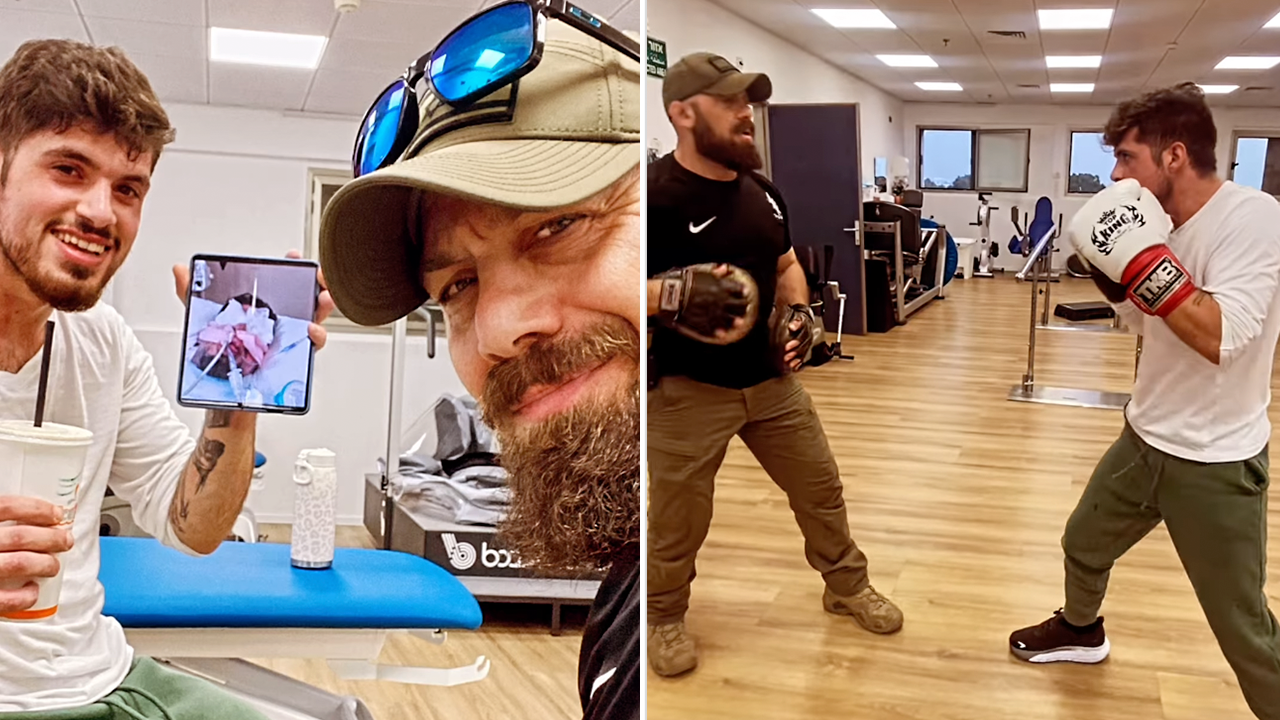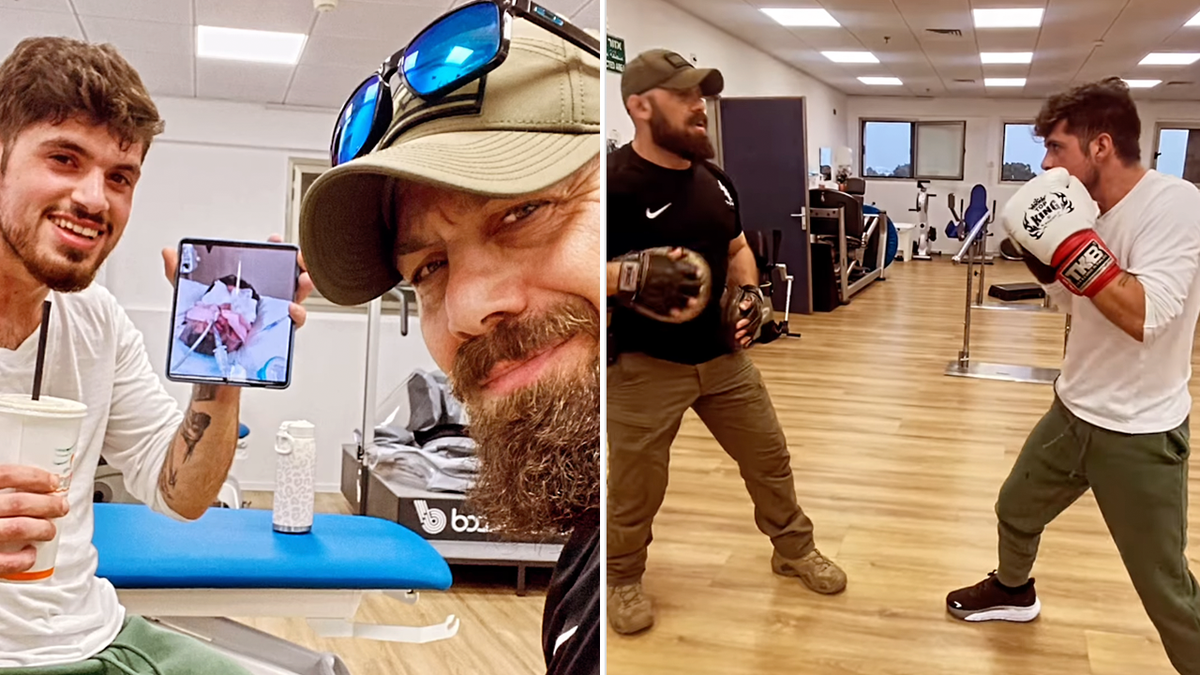Former IDF soldier gives hope, builds resilience in training severely injured soldiers

Former Israel Defense Forces Major Sagi Dovev spent 20 years training young soldiers in Israel’s military before retiring two years ago to start his own organization. But when he woke up on the morning of October 7, 2023, he knew everything had changed.
“Sirens were everywhere. I knew exactly what was going on because I’m in many WhatsApp groups for professional security,” Dovev told Fox News Digital. As he witnessed the atrocities broadcast live to social media by Hamas terrorists that day, he knew war had begun.
On his way to base, friends started calling to tell him that his soldiers had been wounded and were being sent to Sheba Medical Center. Dovev said he immediately turned around and headed to the hospital where he saw helicopters dropping off dozens of wounded soldiers “every few minutes.”
He ended up staying with one of his soldiers that day as he was rushed into surgery to have his leg amputated. But Dovev realized he couldn’t leave these soldiers behind.
ISRAEL HOSTAGES’ FAMILIES HOLD CENTRAL PARK RALLY, CALL ON BIDEN, TRUMP TO BRING LOVED ONES HOME
“When I got called back to base to train at the base, I said, I cannot leave the soldiers here at the hospital. I have to stay here and train them here,” he recalled. “And that’s what I’ve been doing since October 7.”
Dovev, a close combat and resilience trainer who formerly served as a special operations close combat head trainer in the IDF, has spent over a year now volunteering day and night at Sheba Hospital, helping wounded soldiers regain their strength and sense of purpose after being injured in the ongoing war in Gaza.
“It became even more than a job,” he explained.
Dovev shares inspirational videos on his social media accounts showcasing the incredible journeys these young men and women have gone through to recover not just their physical strength, but their mental strength, in dealing with devastating injuries from the war.
ISRAELIS LOOK TO TRUMP AMID DEBATE ON GAZA’S FUTURE: ‘GOING TO ENABLE THINGS THAT WERE NOT POSSIBLE BEFORE’

He shares stories like that of Elisha Medan, who lost both of his legs from an explosion that killed four of his teammates and critically wounded four others.
“But his spirit is high and his resilience is strong. He wants us to stay united (inside and outside Israel) and fight together for the future of Israel. I really hope we are going to see him one day soon, leading this country,” Dovev wrote alongside a video of Medan training with Dovev.
Stories like Dor Almog, a young soldier who was the sole survivor after 21 of his teammates died in a terrorist attack. Dovev shared how Almog went from being hooked up to a ventilator after the attack last January to learning to walk again to training in Krav Maga by that summer.
Or stories like Gaya Zubery’s, the first female soldier severely wounded in Gaza.
“Only a month and a half after completing her training, Gaya was severely injured while rescuing soldiers from a tank hit by an RPG in Saja’iyya. Gaya was injured in both legs and was airlifted in critical condition,” he wrote in the social media post.
“During five months of rehabilitation, Gaya underwent numerous surgeries but maintained her fighting spirit. Her determination and resilience are truly inspiring. Gaya never wanted to be a hero; she simply wanted to save lives. Even after her injury, she says she would do it all over again,” Dovev said.
“I started teaching them how to fight again. How to walk again, how to fight without a leg. How to punch without a leg. How to control their body to learn their new bodies. And that became a big thing,” Dovev explained to Fox News Digital.
“This is what made them feel like warriors again. Because one day they are elite fighters or elite professional athletes, and the next day they need someone to help them take a shower or help them go to the bathroom. They have to learn their new bodies, how to become resilient again. And they do,” he continued.
Sometimes that means sitting by the beds of these soldiers and offering words of encouragement while they remain unconscious.
“We start building it from scratch, from their lowest point,” Dovev said, saying each person’s journey to rehabilitation can take several months to a year’s time.
The proud Israeli feels his calling is to help these soldiers feel strong again and to share their stories with the world, even as anti-Israel sentiment has spread across the globe since the October 7 attacks.
The war between Israel and Hamas remains a divisive issue in the U.S., particularly on college campuses, where protest encampments took over several elite universities last spring.

Dovev, who has seen firsthand the costs of war, offered blunt criticism of students participating in anti-Israel protests.
“Ignorance is not an excuse,” Dovev said. “If any other group was targeted, no one would say, ‘it’s not a big deal.’ But, this is a big deal.”
“They don’t know the situation,” he said of his interactions with students at encampments. “They can’t even point to where the river or the sea” is, referring to the antisemitic phrase frequently chanted at protests.
Dovev sees the fight against Hamas as a fight to preserve not only his people but the freedoms of the entire western world.

“This is the only Jewish land and this is what we are fighting for and this is what we are dying for. For this country, for democracy, for the Jewish people, for the western world.”
“Israel is the only democracy in the Middle East,” he said, inviting critics of Israel to come visit Tel Aviv and see the difference for themselves. “Yet if they come to Gaza, they will be thrown off the roof in five minutes if they are LGBTQ.”
Dovev warned Americans, “You don’t want this radicalism to come to the United States. It has already begun. Look at Canada. Look at Europe. We have to stop the spread of Hamas and Hezbollah and ISIS.”
Israel and Hamas once again appear to be inching toward a ceasefire that could wind down the 15-month war in Gaza and bring home dozens of Israelis held hostage there, the Associated Press reported earlier this week.
Both Israel and Hamas are under pressure from outgoing President Biden and President-elect Donald Trump to reach a deal before the Jan. 20 inauguration. But the sides have come close before, only to have talks collapse over various disagreements.
Last week, Trump was asked about the threats he first levied in early December at the Hamas terrorist organization that has continued to hold dozens of hostages, seven of whom are American, in Gaza.
Israel says about a third of the remaining nearly 100 hostages have died, but believes as many as half could be dead, the Associated Press reported.
Trump told reporters that “all hell will break out” if the hostages have not been freed by the time he enters office.
The Associated Press and Fox News’ Caitlin McFall contributed to this report.






